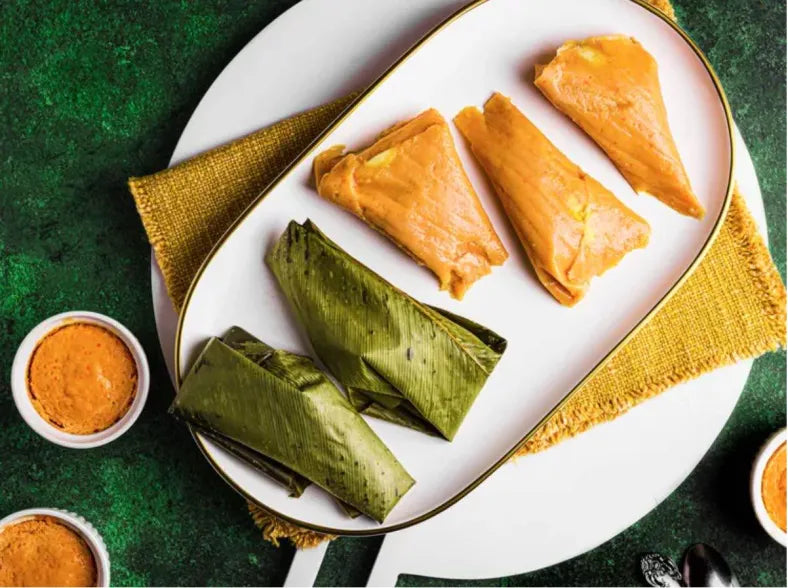
The Essence of Nigerian Cooking: A Flavorful Journey
Share
The Essence of Nigerian Cooking: A Flavorful Journey
Nigerian cuisine is a vibrant celebration of bold flavors, rich textures, and diverse ingredients, shaped by centuries of history, culture, and tradition. From the bustling markets to the family kitchens, food in Nigeria is more than just sustenance—it’s a way of life. Every dish tells a story of community, of family, of rituals, and of the pride Nigerians take in their culinary heritage. At its core, Nigerian cooking is about balancing flavors—spicy, savory, sweet, and sour—while highlighting the freshness and quality of the ingredients used.
A Symphony of Flavors: The Power of Spice
One of the most striking aspects of Nigerian cuisine is its fearless use of spices. The vibrant heat from scotch bonnet peppers, the earthy warmth of ginger and garlic, the depth of onions, and the aromatic power of thyme and curry all come together to create a symphony of flavors. Nigerian food isn’t just spicy for the sake of heat—it’s about creating a balance between spice, sweetness, and savory depth that lingers on the palate.
Take Jollof Rice, for example, Nigeria’s iconic one-pot dish. It starts with a base of tomatoes, onions, and bell peppers, all sautéed to form a rich, tangy sauce. The addition of scotch bonnet peppers gives the dish its signature heat, while thyme, curry, and bay leaves add depth. The rice is then cooked in this vibrant, flavorful mixture, allowing each grain to soak up the spices and create a smoky, slightly sweet, and savory experience with every bite. This balance of flavors is what makes Nigerian food so unforgettable—every dish is an explosion of taste, yet they complement each other perfectly.
The Importance of Fresh Ingredients
Another key element of Nigerian cooking is its reliance on fresh, locally sourced ingredients. The majority of Nigerian dishes are based around vegetables, grains, beans, and meats that are grown and raised locally. It’s not uncommon to find dishes built around hearty tubers like yam, cassava, and sweet potatoes, or nutrient-dense legumes like beans and lentils.
For example, Porridge Yam, a popular Nigerian dish, highlights the earthiness of freshly boiled yam, cooked down in a savory, spiced tomato sauce with onions, pepper, and seasonings. The beauty of this dish is in its simplicity—when made with fresh ingredients, the flavors are clean, bold, and deeply satisfying. Similarly, beans—another staple in Nigerian cuisine—are often paired with rice to make dishes like Rice Stew and Beans, where the beans soak up the flavorful stew, creating a hearty and filling meal.
In Nigerian kitchens, freshness is key. Ingredients like fresh pepper, tomatoes, and locally grown vegetables are essential to creating the authentic flavors that define the cuisine. It’s about honoring the land and the seasons, and working with what’s available to craft nourishing meals that bring people together.
Textures and Techniques: A Rich Culinary Heritage
Nigerian cooking is also known for its rich variety of textures, achieved through a combination of cooking techniques that have been passed down through generations. From deep-frying to slow-cooking, grilling to boiling, the way ingredients are prepared often plays as important a role as the flavors themselves.
For example, the technique of grilling meat over an open flame is a hallmark of Nigerian street food. Suya, the popular skewered beef or chicken, is marinated in a spicy peanut rub, then grilled to smoky perfection. The result is a tender, charred meat that bursts with flavor. The crispy, charred exterior contrasts beautifully with the juicy interior, creating a satisfying bite that’s beloved by many.
Other dishes, like Egusi Soup, are slow-cooked to extract the deepest flavors from ingredients like melon seeds, spinach, and meats. This soup, often served with pounded yam or fufu, is thick and hearty, with a comforting richness that comes from hours of simmering and the careful blending of spices and fats. The texture of the soup—smooth, thick, and full of substance—perfectly complements the soft, stretchy texture of the fufu, making each bite a harmonious experience.
Nigerian Food as a Cultural Expression
Food in Nigeria is a direct reflection of its people—a diverse, energetic, and passionate nation. Just as Nigerian culture celebrates diversity, so too does its cuisine. Each ethnic group brings its own distinctive flavors, cooking techniques, and traditions to the table. From the spicy, earthy stews of the Yoruba people to the rice-based dishes of the Igbo, to the fish and vegetable-focused cuisine of the Niger Delta, Nigerian cooking is a mosaic of flavors, ingredients, and techniques.
The way food is prepared also reflects the communal aspect of Nigerian culture. Meals are often large, shared affairs, with family and friends gathering around to enjoy dishes together. It’s not unusual for Nigerian dishes to be served in generous portions, meant to be shared, symbolizing the strong bonds of family and community. Food is, quite literally, at the center of Nigerian social life.
The Essence of Nigerian Cooking at Fahari Foodtopia
At Fahari Foodtopia, we bring the essence of Nigerian cooking to Dublin, sharing with you the flavors and traditions that define this rich cuisine. Our goal is to serve not only delicious meals but to offer an experience that takes you on a journey through Nigeria’s culinary heritage. From the smoky richness of Jollof Rice to the satisfying comfort of Pounded Yam and Egusi Soup, each dish is a celebration of the bold, balanced, and flavorful cuisine that is at the heart of Nigerian culture.
When you visit Fahari Foodtopia, you’re not just tasting food—you’re experiencing the vibrant essence of Nigerian cooking, steeped in history, culture, and love. Join us for a meal, and discover the flavors that make Nigerian cuisine so special.
Come, Taste, and Celebrate the Heart of Nigerian Cooking at Fahari Foodtopia.
